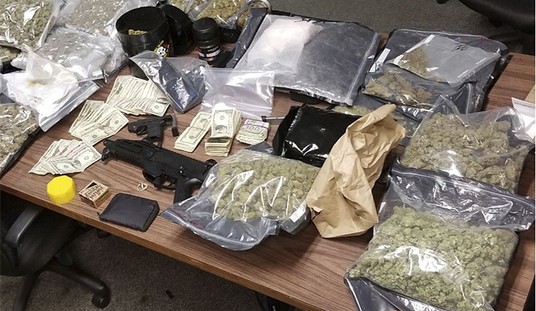It’s another election cycle, and, as sure as you know you’ll see saccharine campaign ads, you can always count on another thing: cries from the Left regarding voter identification. The 2016 campaign season is no different, not that you’d expect it. It’s difficult to remember any recent election that didn’t have underlying drama from a never-ending discussion about just what is and isn’t fair for voters. But we do live in a time when everything is offensive and disenfranchisement is lurking in every corner. Or something.
The latest cry came from the ACLU, which is not exactly a shining beacon of common sense. As reported earlier by Think Progress:
Staff attorney Sean Young with the American Civil Liberties Union will argue before the federal district court in Milwaukee on Monday, asking them to allow these alternative IDs to be added to the state’s strict list of acceptable documents.
The ACLU is also demanding Wisconsin accept student IDs from technical colleges, whose population is overwhelmingly lower income and more racially diverse than the University of Wisconsin system. Under the current law, technical college IDs are not accepted at the voting booth, but IDs from the state’s four-year colleges and universities are valid.
Residents who live in the Wisconsin’s more rural counties may have even more difficulty…as DMVs are only open two days a week and offer no after-work hours in more than half of the state’s counties.
Firstly, that “strict list of acceptable documents” referred to is here, and includes the following:
These are acceptable for voting purposes, and can be unexpired or expired after the date of the most recent general election (currently, the November 4, 2014 election):
-
A Wisconsin DOT-issued driver license, even if driving privileges are revoked or suspended
-
A Wisconsin DOT-issued identification card
-
Military ID card issued by a U.S. uniformed service
-
A U.S. passport (booklet or card)
These photo IDs are also acceptable for voting purposes, but must be unexpired:
-
A certificate of naturalization that was issued not earlier than two years before the date of an election at which it is presented
-
A driving receipt issued by Wisconsin DOT (valid for 45 days)
-
An identification card receipt issued by Wisconsin DOT (valid for 45 days)
-
A photo identification card issued by a Wisconsin accredited university or college that contains date of issuance, signature of student, and an expiration date no later than two years after date of issuance. Also, the university or college ID must be accompanied by a separate document that proves enrollment.
-
A citation or notice of intent to revoke or suspend a Wisconsin DOT-issued driver license that is dated within 60 days of the date of the election
And clearly visible at the bottom of this list is…
If you do not have one of these photo IDs, learn how to get a free state ID card.
But disenfranchisement, and discrimination against low income and ethnicity, right? The list contains many options for the citizen yearning to let their voice be heard by way of vote. Should you not have one of those, you can easily obtain a free state ID.
As reported by the Star Tribune in the wake of today’s hearing:
Assistant Attorney General Clayton Kawski defended the legislation…
He said the ACLU’s plaintiff group has been too loosely defined to merit legal standing and that many of the named individuals have acquired the very forms of ID they said they had been denied. He also said the state Government Accountability Board’s has revised its interpretation of the law to allow technical college IDs, rendering that complaint moot.
Kawski said the opponents are simply unhappy with the Legislature and are asking the court to change a valid law.
The Judge did not rule today, and as reported by Star Tribune as well, it was unclear when that will happen. What’s clear, however, is that this law, signed into effect four years ago by Governor Scott Walker, does not seek to restrict voting rights for anyone in the Badger State. What’s more, the numerous options available make it easy to be a legal Wisconsin voter. Even the technical college ID complaint has been taken care of, and the list of acceptable forms of voter ID has gotten even longer. (Although, if you have a technical college ID and thus are attending a technical college, you should already have a driver’s license or some other form of state ID. But I digress…into common sense.)
The ACLU’s own argument that the lower income, racially diverse, and rural residents of Wisconsin have a disadvantage is clear discrimination itself. Are they saying that these people are incapable of putting the extra effort in for even a free voter ID, or are so lazy that they won’t take the time to exercise a right? It sure seems that this is the case. The complaint that rural residents might have to – gasp! – make special arrangements to go to the DMV is extremely laughable. I don’t believe a police officer will look kindly upon a similar sob story if said rural resident is pulled over without an acceptable driver’s license. If anything, I’d be miffed that my income level, race, or location automatically places me into a category of incapability by the patronizing SJWs at the ACLU. By only putting forth a small amount of effort can one meet the requirements necessary to be included in this process.
These voter ID complaints are nothing more than the lazy looking for a crusade, and finding leaders in those at the ACLU who desire glory in fighting for someone’s rights. The right to vote has been obtained, and a path made clear for women and minorities to do so. Those determined causes of the past were necessary for true equality. The legal wranglings and feet stomping over Wisconsin’s voter ID law in 2015 are anything but that.














Join the conversation as a VIP Member